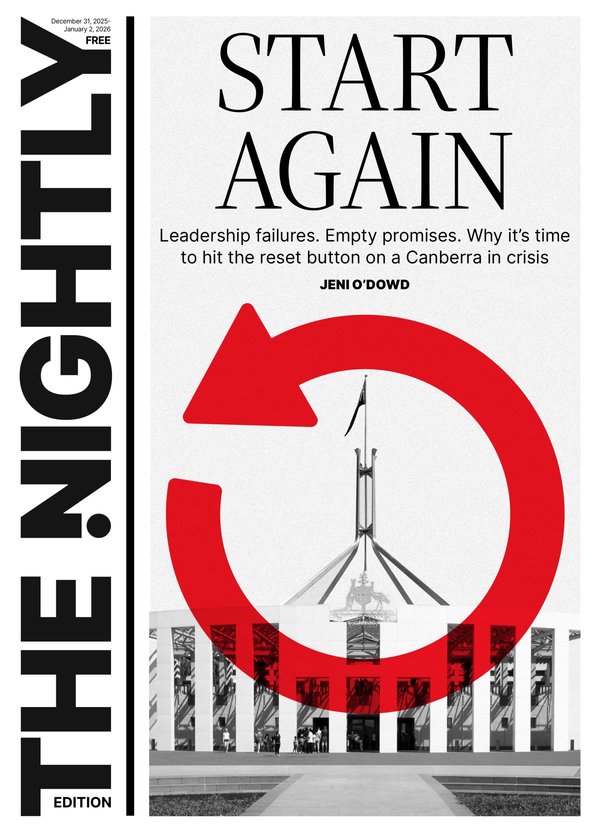BILL SHORTEN: Cracking down on anti-competitive behaviour is ultimately about getting a fair go for families

I noted the other day that an Australian media outlet had dedicated an entire section to “cost of living”, which got me thinking about the ebb and flow of things that are really important to people.
Like everyone else in Australia, except the Coalition right now it seems, I am obsessed with the cost of living.
Australia’s Macquarie Dictionary even named “cozzie livs” the 2023 word of the year, so I know I am not alone.
Sign up to The Nightly's newsletters.
Get the first look at the digital newspaper, curated daily stories and breaking headlines delivered to your inbox.
By continuing you agree to our Terms and Privacy Policy.With this in mind, I have just discovered the esteemed news company The New York Times has a very cool piece of tech that allows you to go back in time.
The aptly named TimesMachine allows readers to search all the newspaper’s archives from 1851 to today.
Search for the term “cost of living” on the TimesMachine and you’ll find a link to an article from November 1937 about then-US President Franklin D. Roosevelt writing to the Federal Trade Commission to investigate retail monopolies for contributing to the increased cost of living America was facing.
In the letter, President Roosevelt called “monopolist practises … unwholesome methods of competition”, which directly impacted the increased cost of living for Americans.
There were countless interesting search results for this phrase stretching back more than a century and what this showed me was that addressing cost of living and protecting consumers never goes out of fashion.
It’s a tale as old as modern economics. In fact, Franklin’s distant cousin, fellow former US president Teddy Roosevelt, was labelled a “trust buster” for working to outlaw corporate trusts and monopolies of the corporations that ran America in the late 19th century.
But I digress. I have written in previous columns that I do the weekly shop for my family. I track the fluctuations in the price of milk, washing powder and meat as forensically as the next shopper looking for the best bargain.
I’m happy that our Government delivered $1.1 million to CHOICE so it can conduct quarterly price monitoring reports for three years to help give Australians the information they need to get the best deal on their weekly shop.
This month CHOICE released its first “basket of goods” report, which found Aldi’s basket was about 25 per cent cheaper than Coles or Woolworths. Through CHOICE, we’ll continue to shine the light on supermarket costs, and I’ll be interested to see the results of the next report in September.
This initiative is an important part of the Government’s broader efforts to boost competition and put downward pressure on the price of essentials, including through our ongoing inquiry into pricing and competition in the supermarket sector run by the ACCC, the Food and Grocery Code of Conduct review, and the Competition Taskforce’s focus on cost-of-living initiatives.
In fact, I have been banging on about supermarkets stitching consumers up for some time.
I have accused Coles, Woolworths and Aldi of “greedflation” as they command a 75 per cent market share in Australia which has allowed them to unfairly squeeze their consumers and suppliers.
With Australians battling the global cost-of-living pressures, upward pressure on the cost of food is an extra helping of stress no one needs.
The Albanese Government this week accepted all the recommendations in a review of the conduct of our major supermarkets, part of a wide-ranging cost-of-living crackdown on anti-competitive behaviour in the food and grocery sector.
My colleagues Treasurer Jim Chalmers, Senator Murray Watt, Minister for Agriculture, and Dr Andrew Leigh, announced the Government’s response to a significant review into the food and grocery code of conduct, which was established to ensure consumers and suppliers were adequately protected from predatory behaviour.
The review found that the current voluntary code of conduct failed to address the imbalance of bargaining power between supermarkets and their suppliers, including farmers.
Suppliers fear retribution from supermarkets if they raise concerns or exercise their rights under the code.
And consumers get the raw end of the stick by being forced to pay higher prices in a monopolistic market.
Dr Craig Emerson conducted the review that will go on to both protect suppliers and encourage a competitive grocery sector that delivers a fair deal for Australians.
The review’s final report made 11 recommendations for improving the code, including making the code mandatory and drawing on submissions received during the review.
The Government has accepted all the recommendations, including that the code of conduct will be mandatory for all supermarkets with an annual Australian revenue of greater than $5 billion.
We will introduce bigger penalties for harmful breaches of the code, with a maximum penalty the greatest of $10 million, three times the benefit gained from the contravening conduct or 10 per cent of turnover in the preceding 12 months.
We will also create an anonymous supplier and whistle-blower complaints mechanism within the Australian Competition and Consumer Commission. This aligns with Labor’s values of sticking up for the little guy and protecting the workers trying to do the right thing.
In a show of good faith, Aussie supermarkets have said they are willing to come on board with compulsory arbitration approaches.
For everyday Aussies, this is good news. Cracking down on anti-competitive behaviour is ultimately about getting a fair go for families and a fair go for farmers.
Our efforts will help to ensure our supermarkets are as competitive as they can be so Australians get the best prices possible, and the weekly shop stays affordable for everyone.
Bill Shorten is the Minister for the NDIS, Minister for Government Services and Federal Member for Maribyrnong.
